
Making a specific type of brain pattern last longer improves short-term memory in rats, a new study finds.
Published online June 14 by the journal Science, the study addressed "working memory," the temporary activation of brain cells that happens as we tour a new neighborhood, for instance, and remember our way around later that day.
Led by researchers at NYU School of Medicine, the new study finds that signals created by brain cells (neurons) – called sharp wave ripples – are longer by tens of milliseconds and capture more information when an animal is learning about a new place than when in a familiar setting.
When the research team artificially doubled the length of the signals involved in memory recall of the best route through a maze, rats with extended ripples were found to be 10-15 percent better at finding a sugary reward than rats without the manipulation.
"Our study is the first in our field that made artificial changes to intrinsic neuronal firing patterns in the brain region called the hippocampus that increased the ability to learn, instead of interfering with it like previous attempts," says György Buzsáki, MD, PhD, the Biggs Professor in the Department of Neuroscience and Physiology at NYU School of Medicine. "After decades of study, we finally understand the mammalian brain well enough to alter some of its mechanisms in ways that may guide the design of future treatments for diseases that affect memory."
The study results revolve around nerve cells, which "fire" – or bring about quick swings in the balance of their positive and negative charges – to transmit electrical signals that coordinate memories. Buzsáki's team in recent years discovered that sets of neurons fire within milliseconds of each other in rhythmic cycles – creating closely connected sequences of signals that can encode complex information.
This observed pattern -- where hippocampal cells in different parts of the circuit fire together briefly – creates "sharp wave ripples." The patterns are named for their shape when captured graphically by electro-encephalography or EEG, a technology that records brain activity with electrodes.
Buzsáki says the ripples represent the 'replaying' and combining of fragments of learned information, part of the process that weaves them into an animal's memory.

